Animal
Man Sells Cow To Buy a Smartphone For Kids’ Online Classes


A man in Himachal Pradesh sold his cow, his only source of income, to buy a smartphone so that his two children could attend their online classes.
Kuldip Kumar of Jwalamukhi in Kangra district said after the schools closed in March, his children studying in Class 4 and Class 2 were finding it difficult to continue their studies in the absence of a smartphone.
This was because after the lockdown was imposed due to coronavirus, schools had moved online, The Tribune reported. And he was under tremendous pressure to buy a smartphone so that his children could attend online classes.


Kuldip was quoted as saying by the news portal that he was told by teachers that if he wanted his children to continue their studies, he needed a smartphone.
Kuldip Kumar said he approached banks and money lenders for a loan Rs 6,000, but no one helped due to his poor financial condition.
In the end, he was forced to sell his cow, also his only source of income, for Rs 6,000, the report added. With this Rs 6,000, he bought a smartphone for his children.
Kuldip, his wife and his two children live a mud hut in Jwalamukhi. He says he does not even have a BPL card.
Kuldip told that he approached panchayat many a times for financial assistance, but nothing was ever done.
Meanwhile, Jwalamukhi MLA Ramesh Dhawala told that he had directed the BDO and the SDM to provide financial help to Kuldip Kumar immediately.
More News from Assam Floods
Follow our page Times of Northeast on Facebook
Animal
Manas National Park to reopen for tourists on Oct 1


The Manas National Park and Tiger Reserve in Assam is all set to re-open for the tourist season 2023-2024.
The national park will be opened for tourists on October 1. This was announced by Rajen Choudhury, the Field Director of Manas National Park in an official communiqué issued on Tuesday.
Meanwhile, reports said that a special event has been organized at the Bahbari Range of the national park in lieu of this. Notably, the national park was reportedly closed since June 5 this year owing to the monsoon season.
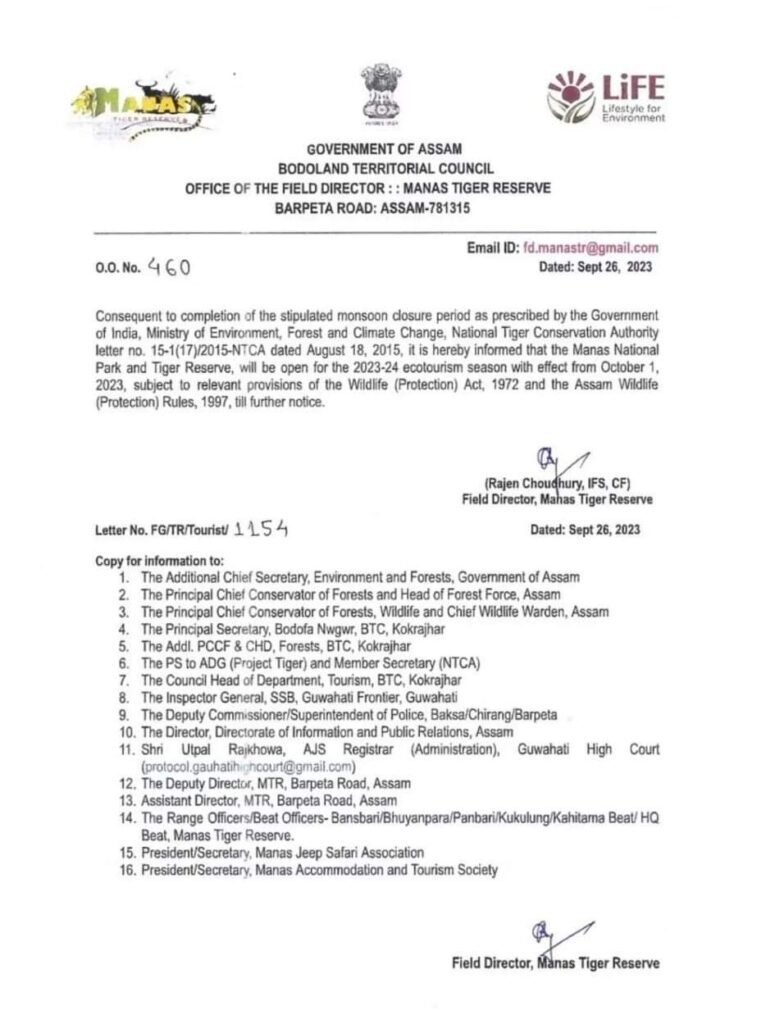

The official notice read, “Consequent to completion of the stipulated monsoon closure period as prescribed by the Government of India, Ministry of Environment, Forest and Climate Change, National Tiger Conservation Authority letter no. 15-1(17)/2015-NTCA dated August 18, 2015, it is hereby informed that the Manas National Park and Tiger Reserve, will be open for the 2023-24 ecotourism season with effect from October 1, 2023, subject to relevant provisions of the Wildlife (Protection) Act, 1972 and the Assam Wildlife (Protection) Rules, 1997, till further notice.”
Animal
1 horned Rhino Found Dead in Manas National Park; Horn recovered
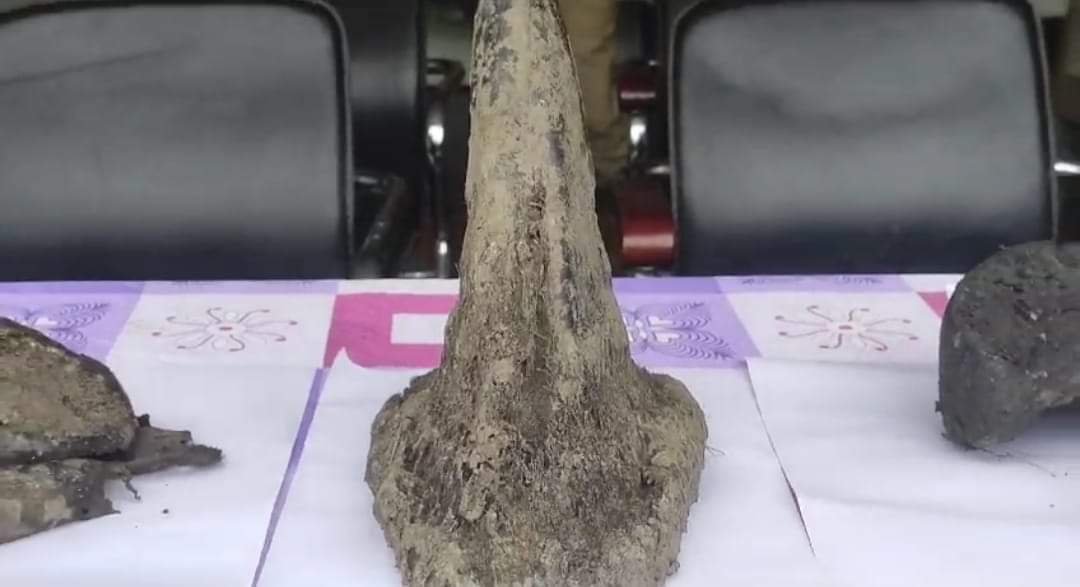

Another skeleton of a One horned Rhino recovered at Manas National Park near Rupohi camp in the Bhuyanpara range on Saturday.
Dr. Vaibhav C. Mathur, the field director of the park reached the site after the incident took place. Prompt action was taken by the authorities to recover the rhino’s carcass.
Although the horn has been recovered from the spot, the actual cause of the rhino’s death is yet to be officially ascertain.
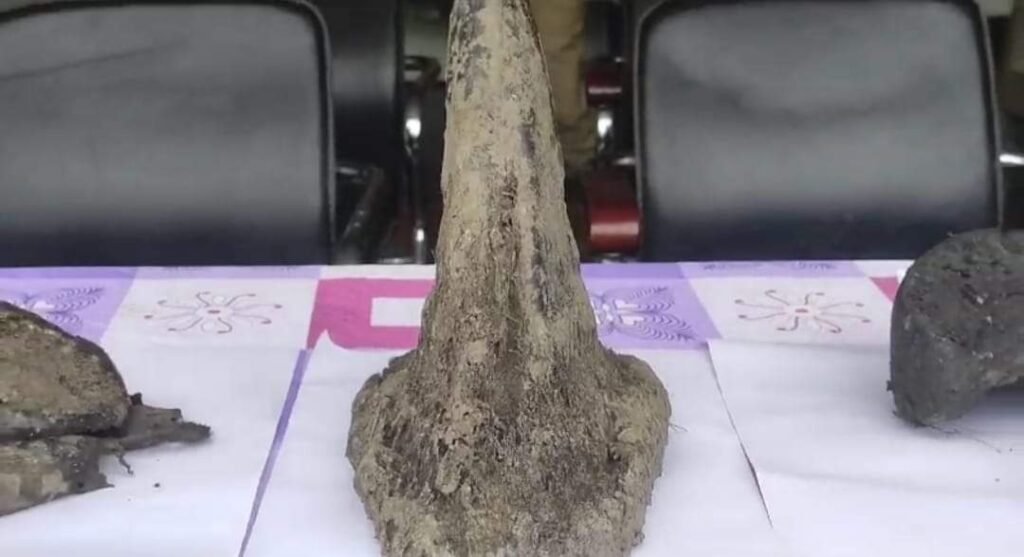

Earlier on August 2, the skeleton discovered at Manas National Park in Assam. Sources said the skeleton was recovered from the Bansbari zone in the national park.
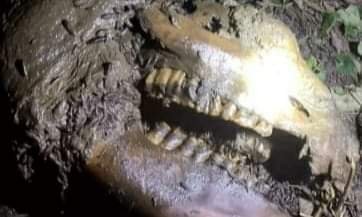

The forest officials reported that the rhino might have lost its life during a fight against an adult bull.
Last month, another skeleton was recovered from a dense forest inside Manas National Park where the horn is missing from the spot.


Meanwhile, Greater Manas Conservation demanded proper investigation into the case.
What’s so special about the horn?
The Rhinos horn is the most expensive product in the black market fetching more than gold, platinum and diamond. It is used in Chinese medicine.According to traditional Chinese texts, such as Li Shih-chen’s 1597 medical text “Pen Ts’ ao Kang Mu”, rhino horn has been used in Chinese medicine for more than 2,000 years and is used to treat fever, rheumatism, gout, and other disorders. It also states that the horn could also cure snakebites, hallucinations, typhoid, headaches, carbuncles, vomiting, food poisoning etc.
Featured
A pig heart transplant in Assam by Dr.Dhaniram Baruah in 1997


On January 7, doctors at the University of Maryland Medical School in the U.S. made news (of pig heart transplant) when they transplanted a genetically modified pig heart into a 57-year-old man.
Few remember now that Dhaniram Baruah, a cardio-thoracic surgeon based in Sonapur near Guwahati, transplanted the organs of a pig into a human body in 1997. However, Dr. Baruah’s xenotransplantation procedure ended badly.
Xenotransplantation is the process of grafting or transplanting organs or tissues between members of different species.
“It is not easy for a human body to accept the organs of a pig. Time will tell whether the human body will accept the organ of a genetically-altered pig,” the 72-year-old doctor, who lost his voice after undergoing throat surgery some time ago, said via S.A. Achrekar, a senior scientist at his research institute in Sonapur.
At an international conference in 1995, Dr. Baruah had said pigs are close to humans in various aspects. He had at the time developed an “electric motor-driven artificial biological heart made of ox pericardium that was implanted in a pig”.
Dr. Baruah said he had carried out 102 animal experiments on xenotransplantation. He transplanted a pig’s heart, lung and kidneys to Purno Saikia, a 32-year-old end-stage organ failure patient, on January 1, 1997. Jonathan Ho, a Hong Kong-based doctor, had assisted him in the transplantation at his research centre.
But Sakia died a week later, triggering an uproar. The two doctors were arrested on January 10 under the Transplantation of Human Organs Act, 1994, booked for culpable homicide and imprisoned for 40 days. Subsequently, the Assam government formed an inquiry committee that found pig heart implants to be unethical and unlawful. Source- The Hindu.
For more stories follow our page Times of Northeast on Facebook, Twitter, Instagram, YouTube, LinkedIn, Koo
Visit our website https://timesofnortheast.com
Times of Northeast is an independent digital news platform which seeks to grab the attention of rational-minded people from Northeast India.
Pig heart transplant, pig heart transplant news, pig heart transplant Assam news
-

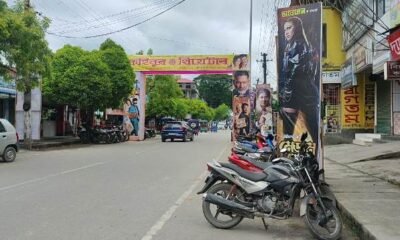

 Featured2 months ago
Featured2 months agoAssam’s Mobile Theatre journey since 1960s
-



 NORTHEAST7 months ago
NORTHEAST7 months ago2 girls drown while taking bath in Pahumara river in Bajali
-

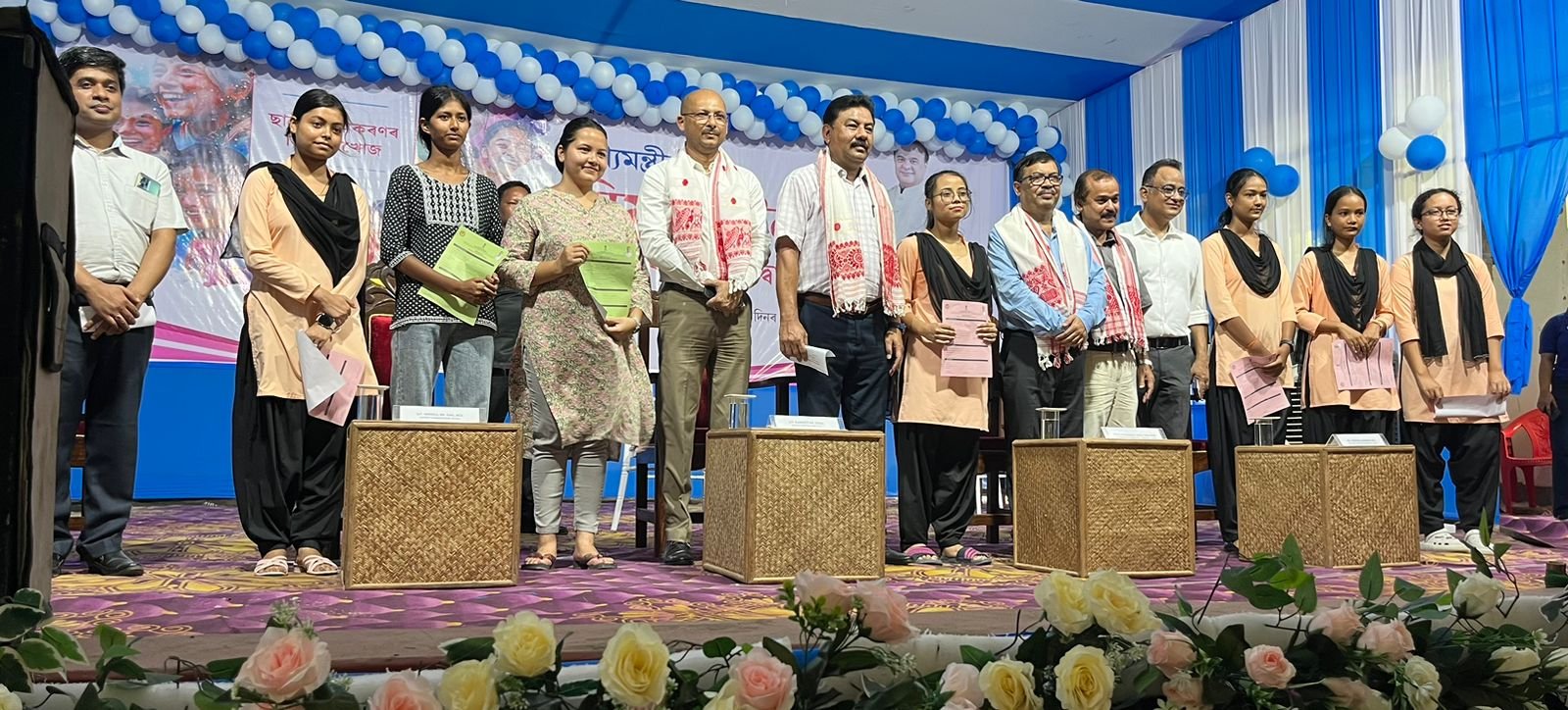

 Assam2 months ago
Assam2 months agoRanjeet Kumar Dass distributs forms of MMNMA scheme at Bhattadev University and NH collage
-



 Featured7 months ago
Featured7 months agoPolice nab 2 drug peddlers at Pathsala
-

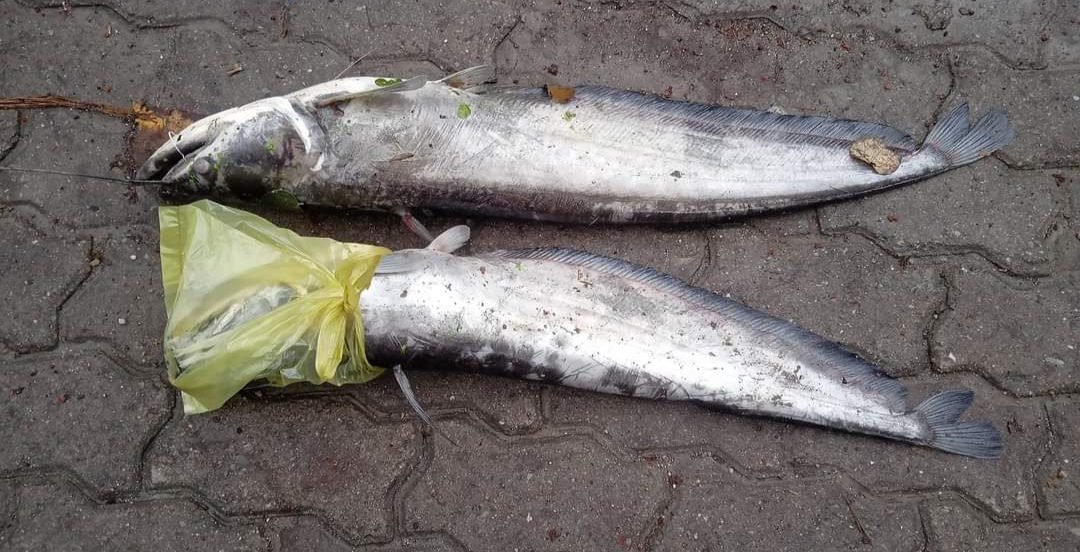

 Featured7 months ago
Featured7 months agoDumping of waste on water body leads death of fishes in Pathsala; baffles nature lovers
-



 Featured5 months ago
Featured5 months agoSpecially abled man appeals for govt aid
-

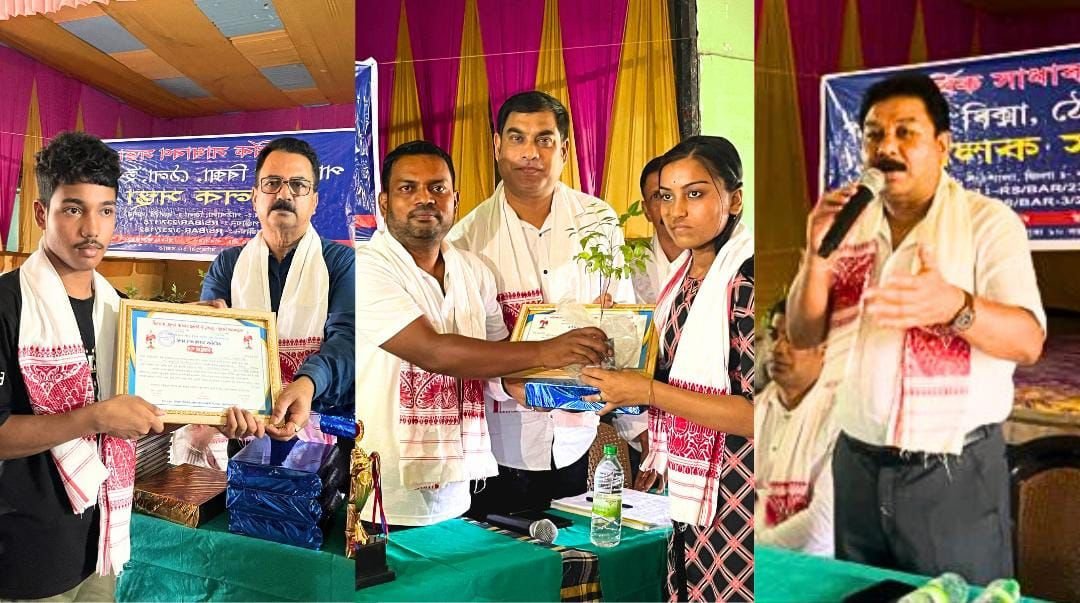

 Featured4 months ago
Featured4 months ago“Whatever you do, do it best with your heart and soul.” Ranjeet Kumar Dass
-

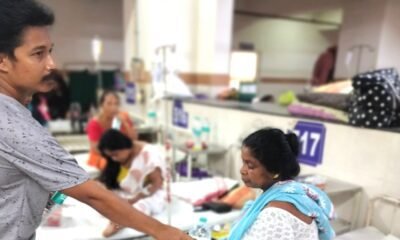

 NORTHEAST3 weeks ago
NORTHEAST3 weeks agoSeveral pilgrims from Assam hospitalised in Gujarat due to suspected food poisoning, 1 dead





